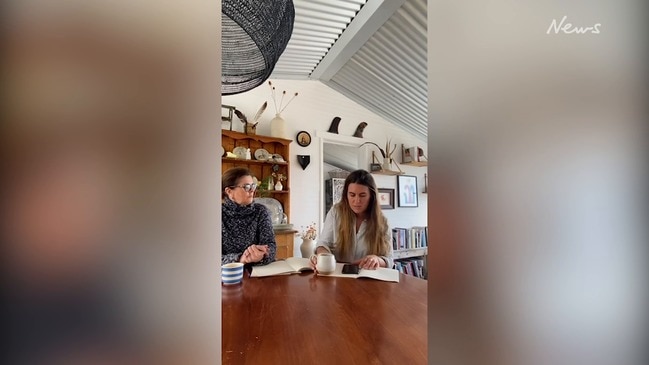Parents’ headache: Home schooling is not simple
Home schooling’s a headache for parents working from home during the coronavirus shutdowns and Education Queensland isn’t helping with its boring and baffling lesson plans, writes Natasha Bita.

Opinion
Don't miss out on the headlines from Opinion. Followed categories will be added to My News.
ARE you au fait with appositions? As the coronavirus crisis hurls thousands of parents in the deep end of home schooling – often while working to feed their families – Education Queensland has helpfully posted two weeks’ worth of lessons on its website.
Twelve-year-old boys will no doubt be enthralled to be studying bush ballads in Year 7 English. They’ll need to “compare and evaluate’’ two bush poems, using “evidence from the text to justify your point of view’’.
Some clever curriculum writers have decided that 10-year-old children in Year 5 should write a “multimodal feature article’’ about a colony of flying foxes close to houses.
What is a multimodal feature article, you may well ask? Does the department mean “multimedia” – with videos and photos? Or the statistical definition of multimodal?
Top tips for parents in keeping kids calm and focused while being schooled at home
Education Queensland prepares to ban assemblies, fetes and sports carnivals
As luck would have it, we have the Queensland Curriculum and Assessment Authority (QCAA) – a state government agency that soaked up $63 million in taxpayer funding last year. Its website includes glossaries so parents can interpret the gobbledygook littering its convoluted syllabus documents.
The QCAA’s definition of multimodal is “a combination of at least two modes (eg spoken and written) delivered at the same time, to communicate ideas and information to a live or virtual audience, for a particular purpose; the selected modes are integrated so that each mode contributes significantly to the response’’.
Got all that? Translated - I think - it means children should ask questions about the flying fox colony and use the information to write a 300-word news article.
But wait – these 10-year-olds also need to edit their multimodal article, to ensure they have “created a cohesive text by using text connectives and pronoun referencing’’.
If you think that’s highbrow, wait til you look at the high school lesson plans for parents to teach at home.

Year 9s have the turgid task of “analysing the use of interaction skills used by Kevin Rudd during the ‘Apology Speech’’’.
The former Prime Minister’s solemn “sorry speech’’ to Australia’s indigenous peoples in 2008 was an important and moving moment in Australian history.
Yet students won’t learn about what was said in this historic speech. Rather, they’ll “evaluate the contribution of interactive skills to the aesthetic value of the speech’’.
In a classic case of style over substance, students are to rate the former PM on his stance, hand gestures, eye contact and facial expressions.
Moving on to Year 10 English, parents can help their teenagers learn all about “appositions, conjunctions, relative pronouns and connectives”.
Unofficial real-world translation: write complex sentences using commas and dashes.
Is it any wonder today’s teenagers suffer so much anxiety and depression when they have to deal daily with school work that manages to be as baffling as it’s boring? Or that so many kids don’t enjoy reading, when every book must be “deconstructed’’ and analysed through the prism of political correctness?

Home-school maths and science lessons appear to be relatively clear and simple. But the zip file format cannot be accessed by everyone because some low-income families don’t have a home computer with the correct software. And there are no online lessons for subjects other than English, maths and science, which will be provided by individual schools.
Schools have, understandably and appropriately, shut down their classrooms a week before the Easter school holidays, to avoid spreading COVID-19 between students, teachers and the wider community. It is likely they’ll stay shut for weeks or even months after the school break.
It’s crucial that children continue to learn at home, despite school closures and quarantine lockdowns. The homework has to be clear enough for all parents – be they academics, doctors, tradies or migrant cleaners – to understand. It must be interesting and relevant, to keep kids engaged.
Education Queensland has had more than a month to prepare simple daily lesson plans, as an essential service during coronavirus closures. They must be made comprehensible to all parents - not just professors of linguistics.
In the meantime, perhaps parents could give their kids some entertaining books, get them to read some news websites, watch history and science documentaries, and keep a diary of these tumultuous times. Who knows?
They might learn more than they did at school.
Originally published as Parents’ headache: Home schooling is not simple

